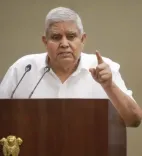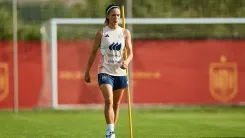How Did Shubhanshu Shukla Carry India’s Spirit, ‘Gajar Ka Halwa’ into Orbit?

Synopsis
Key Takeaways
- Shubhanshu Shukla is the first Indian aboard the ISS.
- His experience symbolizes India's aspirations in space exploration.
- He emphasized the emotional connection to India when viewed from space.
- Shukla brought traditional Indian sweets into orbit.
- His journey serves as an inspiration for future generations.
New Delhi, June 28 (NationPress) On a day that will be remembered in the chronicles of India’s space exploration, Group Captain Shubhanshu Shukla, the second Indian to venture beyond Earth’s atmosphere, communicated with Prime Minister Narendra Modi from the International Space Station.
Orbiting at an altitude of 400 kilometers, Captain Shukla achieved a historic milestone as the first Indian aboard the ISS (International Space Station)—a moment celebrated across the nation.
In a live dialogue with the Prime Minister, he expressed a thought that resonated profoundly: “Jab maine Bharat ko space se dekha, toh laga ki woh nakshon mein jitna dikhta hai, usse kaafi bada hai.” (When I viewed India from space, it appeared far larger than what is depicted on the map). This sentiment transcended mere geography, capturing the emotional essence of witnessing one’s homeland devoid of borders, politics, or limitations—just land, culture, and identity extending beyond outlines.
During a heartfelt and motivational exchange broadcast nationwide, PM Modi commended Captain Shukla, viewing him not just as a scientist but as a beacon of new beginnings.
“Aapke naam mein bhi ‘shubh’ hai aur aapki yatra naye yug ka ‘shubh aarambh’ hai,” he noted, emphasizing how the astronaut’s name itself symbolized the auspiciousness of the occasion.
“Aap se iss samay 140 crore Bharatiyon ke jazbaat jude hue hain,” the Prime Minister added, his voice imbued with emotion.
“Main aap se sirf ek neta ke roop mein nahi, par har Bharatiya ke garv aur ummeedon ka pratinidhi ban kar baat kar raha hoon.”
From the serene surroundings of the orbiting station, Captain Shukla responded with a calm demeanor.
“Main yahan surakshit hoon, swasth hoon, aur Bharat ke liye yah anubhav ek naye yug ki shuruaat hai,” he stated.
“Main desh ka pratinidhitva karne ke liye abhaari hoon. Mujhe kabhi laga nahi tha ki ek din main antariksh mein jaa paunga. Parantu aapki netritva mein, Bharat ne sapne dekhne bhi seekhe hain aur unhe poora karne ka sahas bhi paaya hai.” (I am safe and healthy here, and for India, this experience signifies the dawn of a new era. I am grateful for the chance to represent the nation. I never envisioned that one day I would travel to space. Yet, under your leadership, India has learned not only to dream but also to possess the courage to realize those dreams.)
As the Earth silently rotated beneath him, Captain Shukla shared a perspective few are privileged to experience—a world without borders. “When I saw India for the first time, it appeared much larger than what we see on maps. Observing it from space makes it clear that all of us, human beings, share one common home: Earth. No borders, no states, just humanity,” he reflected.
A delightful surprise aboard the spacecraft was gajar ka halwa, India’s cherished winter dessert, which traveled into orbit along with aamras (mango pulp).
“Main gajar ka halwa aur aamras lekar aaya hoon… yeh sirf swaad nahi, yeh ghar ki yaadon ka ek hissa hai,” Captain Shukla chuckled.
His fellow astronauts, Peggy Whitson from the US, Sawosz Uznanski from Poland, and Tibor Kapu from Hungary, savored their first taste of Indian hospitality, 400 kilometers above sea level. The Prime Minister, pleased with this cultural offering, reminded Shukla of the significant responsibility he now bore.
“This journey of yours is not yours alone; it is a source of inspiration for an entire generation. Now, you are being given a special assignment—your experience will illuminate India’s Gaganyaan mission, our goal of building a space station and stepping onto the Moon,” PM Modi encouraged. Navigating life in zero gravity presents its challenges.
Captain Shukla elaborated on the difficulties of sleeping in space and adjusting to an environment where every movement requires thoughtful consideration.
“Nothing here is ordinary. Even sleeping is a challenge. Without gravity, everything feels different,” he candidly explained.
Despite a year of rigorous training, no preparation could replicate the sensation of floating through each task. Yet, amidst the complexities of life aboard the ISS, Captain Shukla’s presence—and his gajar ka halwa—serve as powerful symbols.
In a world where tradition and technology often seem at odds, he harmonized both, carrying the warmth of his heritage while enhancing India’s global presence in space.
As the conversation concluded, it was evident that this was no typical exchange—it was a national moment of pride, a dialogue between Earth and its aspirations. With pride swelling at home and the Tricolour unfurling above the planet, India discovered in Shubhanshu Shukla not just an astronaut, but a narrative of daring beginnings, treasured memories, and boundless ambition.

